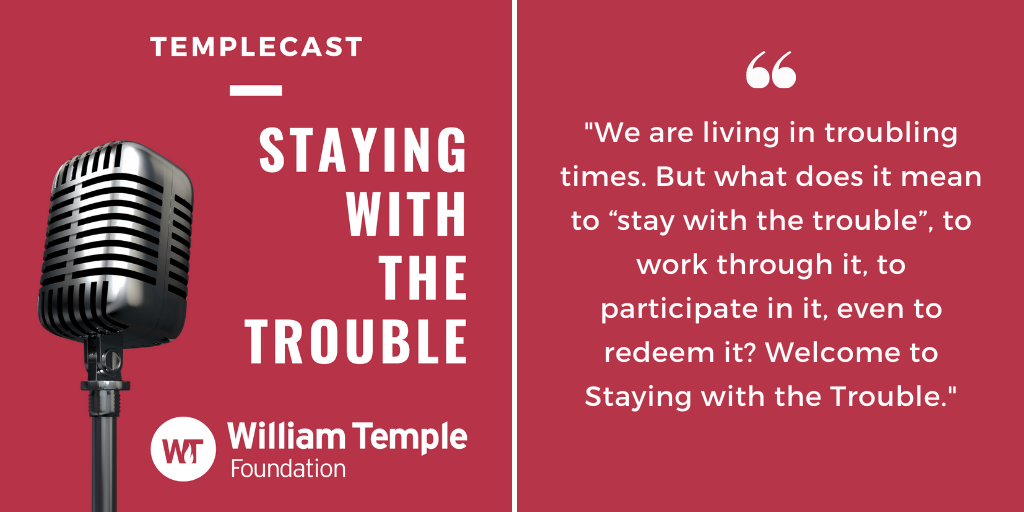Associate Research Fellow Tim Howles reflects on what we’ve learnt from our podcast series.
As part of the Foundation’s commitment to engage with debates on religion in public life, we’ve recently launched a new podcast called Staying with the Trouble. The first series has just wrapped up, so we thought it would be a good opportunity to take stock.
First of all, I know what you’re thinking… “of the making of many audio recordings there is no end, and much listening wearies the body!” But with Staying with the Trouble we’ve attempted to do something a little different. The series combines personal storytelling with intellectual analysis. Each episode consists of an interview with an academic or practitioner who has in some way lived through and faced the challenge of the experience they’re addressing. Together we explore key moments in their journey “into the trouble”: early influences on their thought, moments of revelation, and times when they were forced to shift their thinking. Where do they find the encouragement to continue with their work? What tempts them to despair? Where are the signs of hope, the breakthroughs which might lead to new solutions? In this way, we hope to provide a new format for thinking about contemporary debates on topics ranging from populism to race, from sexuality to the environment, and from disability to addiction.
Speaking as co-host of the series, it’s been a pleasure to engage with such a diverse set of guests. Although we set a general theme for each episode, the conversation was allowed to proceed in its own direction and according to its own momentum. There have been only minor edits to the final recording we have published, so each conversation retains that atmosphere of informality, with occasional interruptions and questions of clarification from the hosts. The aim throughout has been to invite you, the listener, to be “in the room” on a conversation taking place. We hope you like the format.
Even in this first series there has been a wide range of topics and approaches. Some guests began with their academic work, describing how it has led them to address a contemporary “trouble”. Tobias Cremer, for example, drew on his study of how European nationalist populist parties are seeking to employ Christian symbols and language as cultural identity markers. For me, this conversation prompted a number of challenging questions regarding how believers and Church authorities might react to such co-option attempts. Jarel Robinson-Brown described his research into narratives of colour from early church history, allowing us to relate the experience of racially marginalised people from many centuries ago to our contemporary situation. From his personal perspective he also addresses issues relating to LGBTQI+ discrimination in the church and wider society. And Anna Rowlands drew on her work in Catholic Social Thought and Practice to offer some startling new analyses of the troubles associated with forced migration and asylum-seeking.
Other guests began with their lived experience, then deepening its analyses via reference to their academic work. Hannah Malcolm, for example, explained the trouble of climate grief and how she processes her thinking about ecological collapse as an ecotheologian and activist. Azariah France-Williams explored the trouble of institutional racism from the vantage-point of being an ordained parish priest in the Church of England. And in an episode that I confess moved me greatly, Irene Tuffrey-Wijne, a Professor of Intellectual Disability and Palliative Care, reflected on her personal involvement in breaking the news of Jean Vanier’s history of abuse to members of the L’Arche community in London. Irene made some valuable connections between our experience of lockdown and the restricted experience that disabled people have all the time, drawing out implications for our community ethics and praxis.
We are in the process of preparing the second series, so do please share any feedback with us; we promise to take this into account. If you wish to get a taster of what the series is about, you may like to listen to this short trailer. All of the podcasts are available here, or you can subscribe via anchor.fm, Apple, Spotify, Google or wherever you get your podcasts. And finally, a huge thank you to Rosie Dawson, another of the Foundation’s Associate Research Fellows, who has been organiser and producer for the series.
More blogs on religion and public life
- “Barnabas Thrive” led by Revd Dr Paul Monk, is awarded Kings Award for Voluntary Service
by Matthew Barber-Rowell - How could a Temple Tract have had even more traction?
by Simon Lee - Remembrance Day: Just Decision Making II
by Matthew Barber-Rowell - Trustees Week 4th Nov – 8th Nov 2024
by Matthew Barber-Rowell - Some ancient wisdom for modern day elections
by Ian Mayer

Discuss this